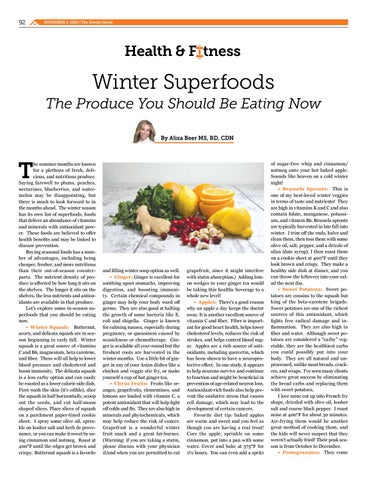92 20
NOVEMBER 5, 2020 | The Jewish Home OCTOBER 29, 2015 | The Jewish Home
Health & F tness
Winter Superfoods The Produce You Should Be Eating Now By Aliza Beer MS, RD, CDN
T
he summer months are known for a plethora of fresh, delicious, and nutritious produce. Saying farewell to plums, peaches, nectarines, blueberries, and watermelon may be disappointing, but there is much to look forward to in the months ahead. The winter season has its own list of superfoods, foods that deliver an abundance of vitamins and minerals with antioxidant power. These foods are believed to offer health benefits and may be linked to disease prevention. Buying seasonal foods has a number of advantages, including being cheaper, fresher, and more nutritious than their out-of-season counterparts. The nutrient density of produce is affected by how long it sits on the shelves. The longer it sits on the shelves, the less nutrients and antioxidants are available in that produce. Let’s explore some in-season superfoods that you should be eating now. • Winter Squash: Butternut, acorn, and delicata squash are in season beginning in early fall. Winter squash is a great source of vitamins C and B6, magnesium, beta carotene, and fiber. These will all help to lower blood pressure and cholesterol and boost immunity. The delicata squash is a less carby option and can easily be roasted as a lower calorie side dish. First wash the skin (it’s edible), slice the squash in half horizontally, scoop out the seeds, and cut half-moon shaped slices. Place slices of squash on a parchment paper-lined cookie sheet. I spray some olive oil, sprinkle on kosher salt and herb de provenance, or you can make it sweet by using cinnamon and nutmeg. Roast at 400°F until the edges get brown and crispy. Butternut squash is a favorite
and filling winter soup option as well. • Ginger: Ginger is excellent for soothing upset stomachs, improving digestion, and boosting immunity. Certain chemical compounds in ginger may help your body ward off germs. They are also good at halting the growth of some bacteria like E. coli and shigella. Ginger is known for calming nausea, especially during pregnancy, or queasiness caused by seasickness or chemotherapy. Ginger is available all year-round but the freshest roots are harvested in the winter months. Use a little bit of ginger in any of your Asian dishes like a chicken and veggie stir fry, or make yourself a cup of hot ginger tea. • Citrus Fruits: Fruits like oranges, grapefruits, clementines, and lemons are loaded with vitamin C, a potent antioxidant that will help fight off colds and flu. They are also high in minerals and phytochemicals, which may help reduce the risk of cancer. Grapefruit is a wonderful winter fruit snack and a great fat-burner. (Warning: if you are taking a statin, please discuss with your physician if/and when you are permitted to eat
grapefruit, since it might interfere with statin absorption.) Adding lemon wedges to your ginger tea would be taking this healthy beverage to a whole new level! • Apples: There’s a good reason why an apple a day keeps the doctor away. It is another excellent source of vitamin C and fiber. Fiber is important for good heart health, helps lower cholesterol levels, reduces the risk of strokes, and helps control blood sugar. Apples are a rich source of antioxidants, including quercetin, which has been shown to have a neuroprotective effect. In one study, it appears to help neurons survive and continue to function and might be beneficial in prevention of age-related neuron loss. Antioxidant-rich foods also help prevent the oxidative stress that causes cell damage, which may lead to the development of certain cancers. Favorite diet tip: baked apples are warm and sweet and you feel as though you are having a real treat! Core the apple, sprinkle on some cinnamon, put into a pan with some water. Cover and bake at 375°F for 1½ hours. You can even add a spritz
of sugar-free whip and cinnamon/ nutmeg onto your hot baked apple. Sounds like heaven on a cold winter night! • Brussels Sprouts: This is one of my best-loved winter veggies in terms of taste and nutrients! They are high in vitamins K and C and also contain folate, manganese, potassium, and vitamin B6. Brussels sprouts are typically harvested in late fall into winter. I trim off the ends, halve and clean them, then toss them with some olive oil, salt, pepper, and a drizzle of silan (date syrup). I then roast them on a cookie sheet at 400°F until they look brown and crispy. They make a healthy side dish at dinner, and you can throw the leftovers into your salad the next day. • Sweet Potatoes: Sweet potatoes are cousins to the squash but king of the beta-carotene brigade. Sweet potatoes are one of the richest sources of this antioxidant, which fights free radical damage and inflammation. They are also high in fiber and water. Although sweet potatoes are considered a “carby” vegetable, they are the healthiest carbs you could possibly put into your body. They are all natural and unprocessed, unlike most breads, crackers, and wraps. I’ve seen many clients achieve great success by eliminating the bread carbs and replacing them with sweet potatoes. I love mine cut up into French fry shape, drizzled with olive oil, kosher salt and coarse black pepper. I roast mine at 400°F for about 30 minutes. Air-frying them would be another great method of cooking them, and the kids will never suspect that they weren’t actually fried! Their peak season is from October to December. • Pomegranates: They come
























